#Irish Culture in Australia
Text
0 notes
Text
the other day I taught a guy the Aboriginal people did not give up their culture willingly and it was in fact a violent and forceful taking through two/three centuries of oppression, systematic murder and stealing of children
#(albeit for some time it was straight up murder rather than systematic)#was absolutely wild when he said it#like 'it makes me sad how they gave up their culture'#and I was like wait what#shouldda mentioned australia day seeing its coming up#also he asked me where I was from#thought I was jewish#was like nah man we all irish/english in my history#with a distant touch of matlese#I just look like this
0 notes
Text
Treat You Better III
Laia Codina x Reader
Summary: You visit Spain

The language barrier posed a bit of a problem but you could get past that.
The food posed a bit of a problem but you could get past that too.
What you couldn't get past was the topless sunbathing.
You weren't prudish by any means. But you were Irish and the beaches you usually went to in Ireland were full of pebbles. You didn't sunbathe in Ireland. You just hoped that you didn't get taken out by a wave.
Spanish beaches were different though. They were sandy and the sea was calm and all of Laia's friends were stripping off their bikini tops and lying out in the sun.
Your eyebrows shot up to your hairline at how easily everyone did it. You hadn't experienced much cultural issues moving from Ireland to England but now you were getting the experience that Laia did.
Moving from Spain to England was a big thing, full of cultural differences that she had to adapt too. Now you're doing the same.
You didn't know the rules surrounding this so you just decided to avert your eyes and pretend that it wasn't happening.
You sat under an umbrella and contemplated whether it was rude to just duck into a shop and stay there until everyone was ready to go.
"You aren't sunbathing?"
"I'm Irish, luv," You say," I don't tan well. I burn."
"Katie tans."
"Yeah, she got lucky. I didn't."
Laia wiggles under the umbrella with you. She's shirtless just like her friends but you don't feel awkward looking at her. You've seen her naked countless times. Seeing her topless seems a little tame in comparison.
Seeing her friends and other world class footballers shirtless was a little different.
"You don't tan at all?" She pouts at you," I could have sworn you did in Australia."
"You were watching me back then?" You laugh," You little stalker."
Her cheeks turn pink. "I thought you were very pretty. It is a shame you won't try to tan here."
"I'll burn," You insist," And we'll go back to London and Katie will tease me. I'm not attempting it."
"But you tan! I know you do! I've seen it!"
"It's too much effort," You say nonchalantly," I'm happy here. I might go and buy an ice cream. I'm fine, luv."
She looks at you suspiciously, her pout getting bigger and bigger the more you attempt to get away.
"Leave her alone, Codi!" You hear someone yell, Mariona you think.
"I'm just wearing her down!" Laia yells back with a teasing smile," Don't ruin this for me!"
"Ruin this for you?" You echo," I see how it is. You want to see me topless."
She tries to deny it but her stuttered words betray her true attention.
"You're cute, luv, but no, I'm not stripping in front of your friends."
"Why not? You're not insecure are you?" Her words come out in a stream, interspersed with random kisses pressed to your face. "Because you're so beautiful and you're stunning and I think you're so much prettier than all of my friends and you shouldn't feel insecure about something like this."
"Laia-"
"Because you have nothing to feel insecure about. And I love you and-"
"Laia-"
"You should never feel bad about your body and-"
"Laia! Luv, shut up. I'm not insecure. I know I have a good body but...These are your friends and they're topless."
Laia frowns. "I don't understand."
You laugh. "It'd be like if we went to the beach with Katie and Caitlin and they whipped their tops off. You would feel a little awkward, wouldn't you?"
You can see Laia think it over for a moment. She turns it over in her mind. You can see the moment she imagines Katie topless because her eyes suddenly squeeze shut.
"I see," She admits," But you promise you do not feel insecure?"
"I promise," You say, laying a kiss on her lips," Just feeling a little awkward. I'm sure after a few more trips I'll feel more comfortable."
She beams. "You want to come back?"
You roll your eyes. "Yes, Laia. This is your home. These are your friends. Of course, I want to come back."
She attacks you with kisses, pinning you against your beach towel.
"Codi!" One of her friends call," Stop kissing your girlfriend! I want to go paddle boarding!"
"Go, luv," You laugh, pushing her away," We have lots of time later."
512 notes
·
View notes
Text
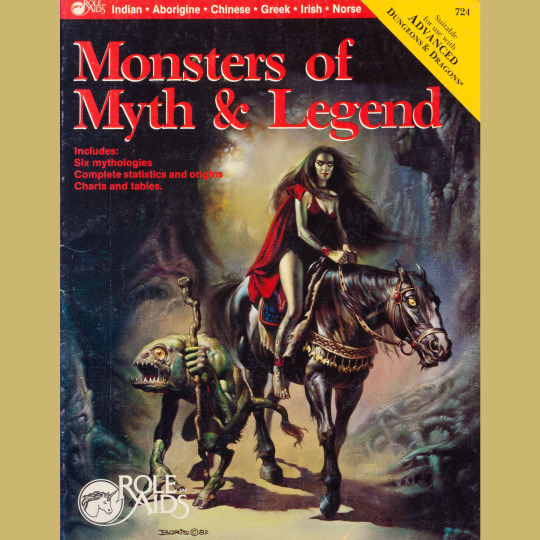
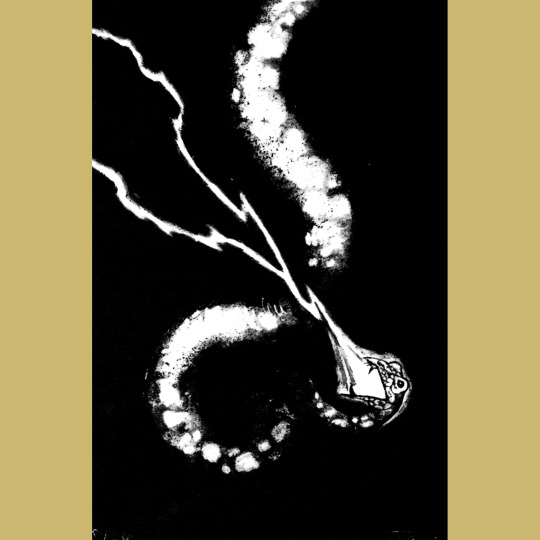
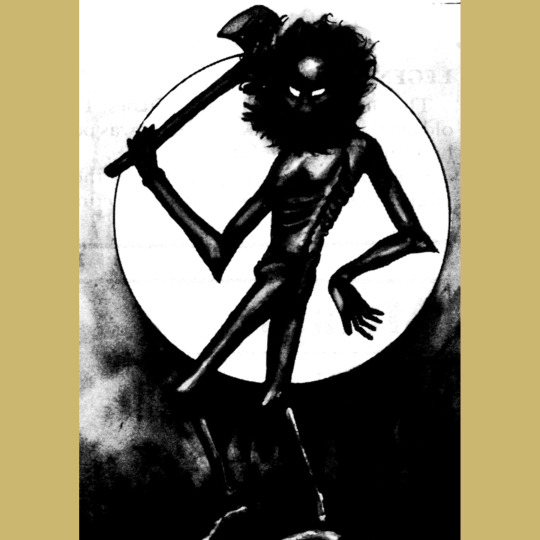
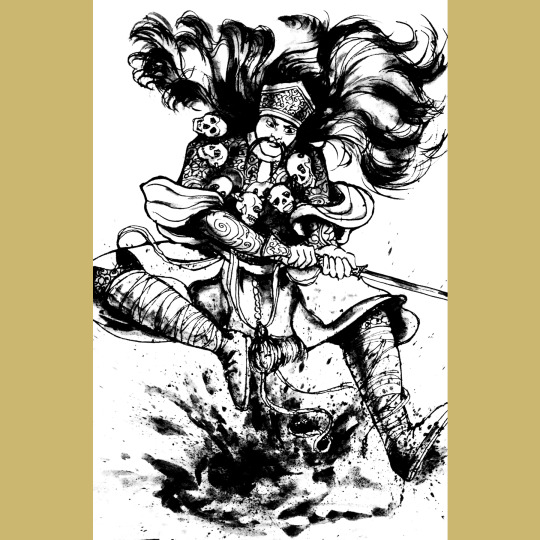
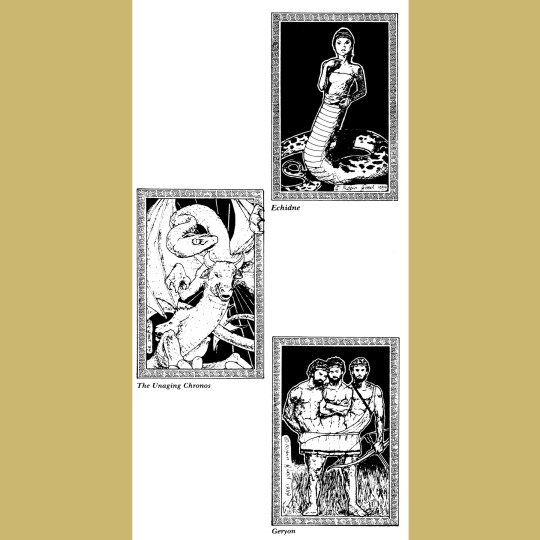
Love a monster book. This is Monsters of Myth & Legend (1984) for Mayfair’s Role Aids line of D&D sourcebooks. As the title tells you, this is a collection of monsters drawn from mythology. Four groupings of them are tied to specific cultures: Norse, Irish, Greek, Chinese. Two other draw broadly from the myths of people living in large regions but which belong to many distinct cultures: native American and Aboriginal Australians.
The mix is pretty solid. I particularly appreciate the monsters from Australia, which are often overlooked in this sort of thing — and even here, I can think of a couple more I would have liked to have seen, like the Pangkarlangu (neolithic cannibals), though it is nice to get attributes for Malingee (shadow spirits with burning eyes) and Murgah Muggulu (a kind of dream spider). Weird that there are still some deep cuts from Greece — maenads, mares of Thrace, even Scylla — who don’t have D&D attributes. The China chapter is probably the most robust, providing a variety of spirits and monsters that have multiple potential applications in the game. China also has a giant with no head, which is maybe the most delightful monster in the whole book.
This is maybe one of my favorite Boris Vallejo paintings that were recycled for Role Aids covers. It downplays physique and features a rad monster, both of which seem unusual for Boris. Its more atmospheric, too, a bit more in line with Frazetta, honestly. The interiors are by Teanna Byerts and Robin Wood. I don’t dislike them, but they do seem diminished by tight deadlines, if I had to guess.
#roleplaying game#tabletop rpg#dungeons & dragons#rpg#d&d#ttrpg#Mayfair#Role Aids#Monsters Of Myth And Legend
84 notes
·
View notes
Note
What are y'alls favorite ecosystems?
Laios: The Australian Outback is full of some of the most amazing and deadly species on the planet, with unique adaptations that are rare to find anywhere else on earth. It has some of the most incredible views, and the arid environment is always persevering and thriving in the most unexpected ways. The outback is a place of constant wonder and nostalgia for me. Ever since I was a kid, and up until recently really, I always struggled to find a place where I could fit in and be myself. Me and Falin grew up on a small Emu farm in the bush, so I spent a lot of time on the outskirts of the outback, sticking to the same paths so that I wouldn't get lost, and despite it being dangerous, as long as I was careful, it ended up providing a safe haven for me until I saved up enough to leave the country and forge my own path in the world.

Falin: Definitely Tropical Rainforests, they hold the largest number of insect species on the planet (2.5 million in the Amazon Rainforest alone!) and are endless in their importance. There are so many things left to discover in them, from hundreds of hidden cave systems, around 80,000 plant species and, along with the ocean, they act almost as the lungs of the earth, providing most of the oxygen we need to survive. Last year, Marcille and I worked with SPUN trying to map as many mychorrzial fungi as possible, in several tropical forests of South America, Africa and Australia. After a year spent buried in the undergrowth, among the ferns, moss and mulch, it's like you can feel Earth's beating heart. I would love to return to one of them soon.

Marcille: Archipelagos. Groups of islands, both tropical and temperate are my favourite places of study. Every island has it's own unique ecosystem and these multitudes of them contain the secrets of evolution, genetics and cultural changes throughout history. From animals adapting to each island and forming new species, to ethnobotany and traditions that change and adapt, stemming from when people first took to the sea, and the legacies they leave behind to this day.

Chilchuck: The Irish Countryside. Valleys, Vales or Dales, whatever you wanna call them, there's nowhere I like being more. Despite having travelled the world with Laios, Falin, Marcille, and later Senshi, there isn't much that compares to the rolling hills of home.

Senshi: Microbiomes of all habitats. People often overlook the importance of the little things, and all the good they do for us in return for leaving them be. Macrophotography has always been a large passion of mine, and I'm fortunate enough to have landed a career in capturing the beauty of it all.

#dungeon meshi#dunmeshi biosci au#laios#laios touden#falin touden#marcille donato#chilchuck tims#senshi#dunmeshi#laios answers#falin answers#marcille answers#chilchuck answers#senshi answers
48 notes
·
View notes
Note
Hi, this debate over claiming ethnicity vs nationality has definitely had me thinking. And I just wanted to contribute my Australian opinion. On one side my family has been in Australia for so many generations I wouldn’t even have a clue where to look to find out where we were before, but on the other side I have a grandfather who was born and raised in Ireland and he immigrated here a long time ago. And even though I personally have nothing to do with Irish culture that shouldn’t mean that I can’t claim some sort of connection just based on the fact that I’ve never been to Ireland. In fact, because it is a place of my heritage it is a place I want to visit and learn more about. So yeah, I’m Australian but I’m also Irish.
.
31 notes
·
View notes
Text
What do we celebrate on St Patrick's Day exactly?
The triumph of Christianity over older pagan religions?
The excuse to irresponsibly drink green dyed beer?
The culture your family may be descended from?
Over the past few years, I've become fascinated by the Irish perspective on the world, as expressed by both politicians and artists.
Irish people today benefit from white privilege, being a wealthy nation, and being part of the in the Anglosphere.
And yet they are unique in that Anglosphere; unlike the white residents of Canada, England, USA, Australia, and New Zealand, Irish history and tradition is that of the colonized rather than the colonizer. They experienced loss of language and political independence; they lost many due to wars of conquest, man-made famine, assimilation and migration.
The Irish are in a unique place; subjugated enough to be critical of Imperialism, yet privileged enough to be heard above most other dissenters around the world.
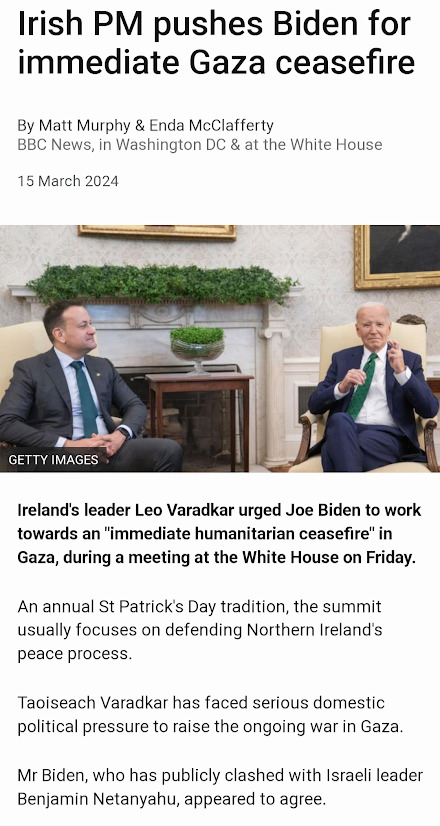

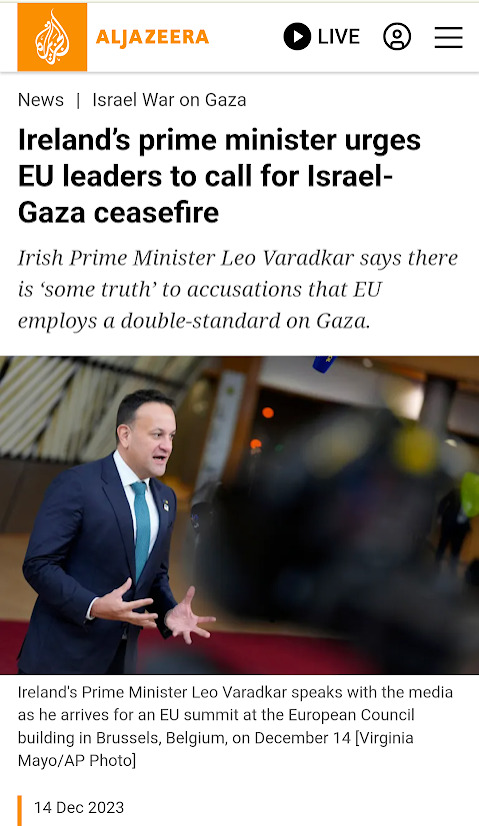


Ireland is one of the most pro-Palestinian nations in the world. Public support for Palestinians is higher in Ireland than even some majority-Muslim countries, according to polling data. Ireland was the first European Union member to call for Palestinian statehood in 1980 and the last to grant Israel permission to open an embassy in 1993.
#leo varadkar#st patricks day#ireland#irish history#free palestine#free gaza#ceasefire now#hozier#sxsw#sxsw 2024
38 notes
·
View notes
Note
Sorry for the racist anon
I dunno how it works for Native Americans, but In Australia, those with Indigenous bloodlines are considered First Nations, no matter their skin tone of ethnic features.
This is largely due to ethnic genocide and colonisation, which I’m guessing Native Americans also experienced(of course), so to see a Indigenous person cry that someone’s “too white” to be First Nations is sickeningly ignorant.
aha I appreciate that <3
And I actually can totally relate to that because my bloodline falls under First Nations labelling! Except instead of being Australian, I'm Canadian haha I don't know if it was the same in Australia but it was practiced for a long time here (I think up until the 80's?) that if you were a First Nations woman who married a non-First Nations man, you'd lose your status as a First Nations woman. So my grandmother, who was raised in a residential school from a very young age, lost her legal status after marrying a French man and that passed on to her children and even her grandchildren. So I actually wasn't legally considered First Nations until around my preteens/teenage years when we were able to contest our status and bloodline with the government and get it back. Colonization unfortunately runs very deep in my family across the generations going back to my grandmother, much of my father's side of the family are strictly Christian (like, I'm talking "women aren't allowed to wear pants" type Christian) and I was raised as someone who was visibly different in a community of predominantly French/Irish people, but no one had the tools or resources to tell me why I was different without giving me an extremely whitewashed version of events. It makes me really upset for past me because being different really alienated me from a culture I didn't understand and didn't want to bother understanding at the time - I didn't want to be First Nations, because being First Nations was "weird" and "different" and I wanted to fit in.
Thankfully now I'm an adult and I've learned that my culture isn't something to be ashamed of, but proud of. Sometimes it makes me a little sad to feel like a foreigner to my own peers, where I'm learning about traditions and norms that many already had from childhood, but it's been a fun learning experience and it brings me so much joy to reconnect to a history and culture that was almost wiped out with my grandmother. I'm glad I learned about my culture and what was almost taken from me before it was too late.
It's frankly why it really shocked me in that previous ask, hearing "eh, you're not brown enough to be Indigenous and you should stfu" because I was literally picked on and singled out - even by my own white-passing family members - for being brown and "the odd one out" growing up. Being called a "cracker" was definitely a new one for me, I've been called every other manner of name for being darker-skinned and having visibly native features but never a name for not being dark-skinned enough ?? Like man, that's wild. Unlocking some whole new side content right here LMAO
#like damn i'm mean about rachel and her work on here but you don't see me going full on “idk are you REALLY from new zealand???”#so idk why people think they have a free pass to be all “ur not brown enough”#like damn when did i ask for your opinion on my race lmao#i guess all those years of being made fun of for being brown weren't real#ama#ask me anything#anon ama#anon ask me anything
71 notes
·
View notes
Text
Just saw someone compare the 'Celts' of the 'Celtic Isles' to indigenous peoples of the US and Australia, to Jews and Sámi peoples.
Buddy no one is 'trying to erase' the concept of Celtic indigeneity like they are with these other groups because it is not the same thing!!
I understand I cannot post about how horrifying this concept it is without erasing the concept of Celtic indigeneity. But I am not erasing it because it doesn't exist unless you're some kind of fucking ethno-nationalist loon.
How do we recognise these indigenous Celts, hm? Is it the red hair and green eyes? The wode and tree lore? Should the nasty Saxons get out of their lands and go back to the continent? While we're at it let's have reparations from Rome.*
*(this makes me sound like I'm against serious land back campaigns and reparations when I'm not. The 'Celtic' nations already have devolved governments and flourishing independence campaigns because they are actual countries with diverse populations, not people confined to reservations where they can be conveniently discriminated against by a central government or diffuse groups scattered by not so historic pogroms. Again, not to make it sound like there isn't discrimination against people of these nationalities, but it is not discrimination rooted in anyone's indigenous identity)
People from countries with languages termed part of the Celtic language tree do face hardships owing to lingering ties with Westminster and have historically suffered from colonialism. Language has been a huge part of the effort to suppress any nationalist feeling or identity different to the colonial ideal. Indigenous blood or genetics is not a part of this and should not be brought into it and the only people I've seen seriously argue for that are extremists.
I'm from a mixed family, so I find this talk particularly terrifying to be honest. I'm not giving any company my dna sample but I know from my family history it would be Irish, Scottish, Ashkenazi Jewish and a smidge of English. I don't know if that makes me an indigenous Celt by this person's standards - I was born in England, and speak with an English accent. It seems to me that by the standards of 'indigeneity' applied here, a white Irish-American whose family fled the famine would have more chance of qualifying as a 'Celt' than a first or second generation immigrant poc born and raised in Wales, for example, speaking Welsh as they grow up, and contributing to the economy of Wales.
At the moment there has been a spate of horrifying racist attacks on immigrants in Northern Ireland, some connected to the wider racist riots in England, but many occurring before then and still continuing now. Some of it is Unionist, and some of it is Irish Nationalist. Hatred of immigrants, especially 'visible' (i.e. non-white) immigrants has been the first thing to unite nationalist and loyalist extremists in quite some time. The slogan 'Ireland for the Irish' has been appearing on buildings where people of colour live - many of whom have moved here to raise their children as locals and to work in sectors like the NHS, which is in a woeful state here.
I don't believe in Ireland for the Irish. I don't believe in Celtic indigeneity. I hope, one day, for a united nation of Ireland to occur peacefully, with the peaceful consent of the loyalist minority, and to be a country where the Irish language flourishes in culture and society, where immigrants of whatever nationality are welcomed and invited to integrate and share their own culture too.
---
eta: apparently the user I saw with this take is known for being a massive racist, so no surprises there! Given that they're apparently particularly racist about Palestinians it would be funny to introduce them to some bona-fide 'indigenous Celts' though

#i don't think i dare have reblogs on for this#tag i apparently need now:#you're not an eireaboo you're an ethno nationalist
10 notes
·
View notes
Note
An ask you had recently mentioned American-Centrism (which is it's own topic, and was just a jumping off point for my line of thinking here), and one of the comments on it talked about how people in the USA, Canada (and Australia and New Zealand, etc) will talk about their ancestry. We've all seen people say they're Irish, for example, before they say they're American, even though their family has been in the USA for several generations. Or Italian American, or a Canadian who's "German and Irish", and so on with other countries and other nationalities. It's a veritable plague in many ways.
I'm not saying it's wrong to be frustrated by this by any means--it's a massive pet peeve of mine. I'm from the Balkans, and while I won't get into my own ancestry, suffice to say my family has been living in the same area for centuries, and likely longer. There are buildings in my small town centuries older than the USA. We have rich traditions that the "New World" (so to speak) simply doesn't have. Hearing someone say they're as "Balkan as I am" is frustrating, especially when they try to lecture me about my own culture. It leaves a sour taste in my mouth, and in many cases the push back against these people is well deserved.
But I don't ant to ignore how complicated this all is either. "White American" (or Canadian, Australia, New Zealand, etc) is seen as a cultural void almost--just look at the jokes about people having no culture. But humans cling to ancestry and want to learn more about where they come from, as that's human nature. When your family has done everything to remove their culture and fit in with a new society, it effects you, and that in turn effects how these people interact with the culture they feel like they're missing. There's a reason why diaspora populations have their issues after all, and why those issues are so unique. Culture is entrenched in humans, but a lot of people don't have access to it in a way they once did. My country isn't rich. It's pretty shitty in a lot of ways, but you can FEEL the culture and entrenched traditions here. You can't in a lot of the places people who cling to their perceived past live (in my experience in moving for school and living briefly in the USA and through my area of study).
I have an aunt who moved to the USA in the 80's. She didn't teach her children her mother tongue so they could fit in, and did everything she could so that she, her husband, and their children, could fit in and have "American dream". And in some ways, they did and still do. But as we all know, the American Dream is hardly perfect. Seeing how desperate my cousins now are to have a connection to their culture, I think I can understand why people cling so hard to what they feel like they're missing.
I'm not saying that they're in the right, and I do think these people who cling to that whatever percent (insert ethnicity) need to sit down and fucking listen. They're showing themselves as ignorant more often then, and need to stop talking over others. That's a sure fire way to have everyone hate you.
Going back to the example of my cousins. One was horrible about this for awhile, and she's first gen. She grew up with people saying they were X percent this, and Y perfect that. So she parroted it. And I hated her for awhile. But she eventually (thankfully) grew up, and came to visit and asked to learn and to grow. That makes such a huge difference. Most people, in my experience, are happy to share culture when it's done in a respectful manner and coming from a place of genuine interest.
I know this is all incredibly nuanced, and I'm not expressing myself perfectly. The push back against American-Centrist is well deserved in many ways, but that doesn't mean there aren't other parts to the conversation. Maybe it's because my area of study is anthropology and human culture is deeply entrenched in my day to day research, but I find it both fascinating, and incredibly sad.
*note, I'm not saying there is no culture in America. But responding to people here and in the internet in general, and stating some general observations.
--
People are also just used to communicating with other locals.
In the US, me being a specific flavor of Irish/Scottish/English/German/Protestant French mutt is what distinguishes me from other white people. It's not weird to talk about your background in a context where a lot of people's families aren't originally from here. You're a such-and-such-American as opposed to some other kind of American.
It's just that when one goes online into a highly international space, local shorthand doesn't really work.
95 notes
·
View notes
Text
RE-CLAIMED 'WHITE' FLAG

RED: HALF-/-MIXED WITH AMERICAN/IRISH/AUSTRALIAN/BRITAIN OR FULL WHITE INCLUDING: MEXICAN SPANIARD, AFRICAANS, SLAVIC, ROMANIANS, AND NATIVE WHITE PEOPLE/PEOPLE WHO ARE CONSIDERED WHITE BUT AREN'T TECHNICALLY!
PINK: GIRLS/FEMININE ALIGNED PEOPLE +sunshine, sun fall,
YELLOW: NON-BINARY WHITE PEOPLE +flowers, nature, fauna, and flora
GREEN/BLUE: MASCULINE WHITE PEOPLE +beaches, dogs, hunting, guns, summer sports, rain
WHY FOR REASONS:
-qan/anti-stereotypes about people who fit under the white label such as french people, this does not automatically mean I refer to the big 4/3 ethnicities that are considered white (USA/AMERICA, AUSTRALIA, BRITIAN.) nor does this mean I automatically won't listen to other POC people.
-Just for a flag to refer back to since then it is easier to understand and is easier to use when someone is describing a person of white ethnicitiy/race.
-Also, I think its cool to spend time to make the official one since it encompasses so many aspects of white culture. this one is just for the time being.
-disclaimer: I am not claiming anything nor am I seeking any sort of authority for this small project, I just wanted to do it.
7 notes
·
View notes
Text
Yo... apparently, I'm a racist now for pointing out history.

It's history.
I know a bit about colonialism because my people were both colonials and indigenous. The colonies were not just 'white people' there were also slaves from Africa, Irish indentured servants, Native American, and French. Prisoners of all kinds as well. The colonies were where people went when their country didn't want them anymore. Think of Australia. Think of India. Think of the Caribbean Islands. They were all colonies of the British empire. The descendants of the colonies are still living there today. My people are still here on the same land they've been on for over 6000 years. Land that was owned by Napoleon and is still under Napolianic law today.
But it's apparently bad to strike up a friendship with those considered enemies. Or even fall in love. Because it hasn't happened before... wrong. It has. Why do you think all these countries exist? Jamaica? The Philippines (oh yeah, Spain did it too when Spain has Moorish blood in it)? Dominica? Mexico? South America as a whole? Yeah, Spain is the the one with the Genocide count. But if you know anything about Spain, is that it was invaded by the Moors. Before that it was part of Gaul and there were Celts still running around before Rome drove them out. I haven't even gotten to the Mongols or the many wars between the warring states in China that almost whiped each other out. Or Nanking, where Japan came in and tried their hand at Genocide to. Cambodia. Laos. All these countries have seen atrocities that you don't even know about.
I mean, this is human history. This is why we have so many cultures and countries.
Because of war and colonies. You've got to take the good with the bad. Because we really wouldn't be here if it weren't for the past.
#this argument still doesnt work because no one goes look back in history.#this is human history#but thanks for calling me a racist fuck when you only showed a piece of a post to fit your narrative#blocking you now#history#atla
10 notes
·
View notes
Text
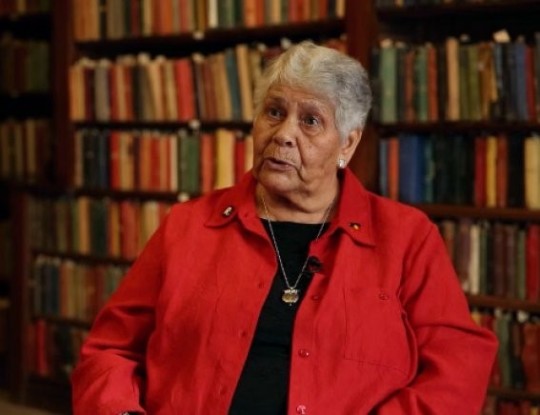
Lowitja O’Donoghue was told as a child she would never make anything of her life, but the Yankunytjatjara leader went on to change the course of history through her advocacy for Australia’s Aboriginal and Torres Strait Islander peoples.
Taken from her mother and her culture at two years old as one of the stolen generations, she said the harsh discipline she experienced growing up in a loveless mission home ignited her appetite for social justice and equality for First Nations communities.
The life of O’Donoghue, who has died on Kaurna Country in South Australia aged 91, was shaped by the prejudice she experienced as a woman born between two cultures – Aboriginal and white – and by her refusal to be defined by it. Her formidable capacity for activism was triggered by her battle to become the first Aboriginal nurse at the Royal Adelaide hospital, despite the matron repeatedly telling her to “go nurse your own people in Alice Springs”.
At the time, O’Donoghue had no idea where she came from, but she knew it was not Alice Springs/Mparntwe.
From a working life that began as a 16-year-old servant, O’Donoghue went on to become the first Aboriginal person named a Companion of the Order of Australia, the first to address the UN general assembly and the first chair of the now defunct Aboriginal and Torres Strait Islander Commission, overseeing its most successful years.
She was a lead negotiator alongside then prime minister Paul Keating in the drafting of the Native Title Act that arose from the high court’s 1992 Mabo decision. It was Keating who shortlisted O’Donoghue for a vice-regal position, one that ultimately went to Sir William Deane.
In his 2018 oration named in her honour, Noel Pearson called O’Donoghue “our greatest leader of the modern era”.
“Resolute, scolding, warm and generous – courageous, steely, gracious and fair. She held the hardest leadership brief in the nation and performed it bravely and with distinction,” he said of her guidance during native title negotiations.
O’Donoghue was the fifth child of Lily, a Yankunytjatjara woman, and Tom O’Donoghue, an Irish stockman. She was born on Anangu Pitjantjatjara Yankunytjatjara lands at Granite Downs station in South Australia in 1932. While never certain of her birthdate, O’Donoghue celebrated it on 1 August, the date given to her by white missionaries.
“All I know about my birth is that I was actually born in the bush, like all Aboriginal children at those times. It was a traditional birth attended by the grandmothers as, of course, is the traditional way. And the only other thing I know, of course, is that I never had a birth certificate. And, of course, I still don’t have a birth certificate,” she told the Australian Biography project in 1994.
She never knew her father, and when she was two, she and two of her sisters were taken from their mother by missionaries acting on behalf of the Aborigines Protection Board. The girls were sent to live at what was known as the Colebrook Home for Half-Caste Children, where they were forbidden to speak their language or ask about the whereabouts of their parents. O’Donoghue did not see or hear from her mother again for more than 30 years. In a 2011 interview , she recalled the grief of her childhood, saying she did not remember ever “being kissed or touched or loved or anything like that”.
In a 2006 interview, she said: “I didn’t like it of course, particularly when we were told our culture was of the devil. And because I heard that too many times I became quite rebellious because I was always asking the questions: Who am I? Where did I come from?”
O’Donoghue attended Unley general technical high school, but at 16 was sent to Victor Harbour as a servant for a large family. Two years later, she began basic nursing training before attempting to transfer to the Royal Adelaide hospital to continue her education. When the matron refused her because she was Aboriginal, O’Donoghue took her battle to the state premier and anyone else in government who would listen to her case.
“I’d resolved that one of the fights was to actually open the door for Aboriginal women to take up the nursing profession, and also for those young men to get into apprenticeships,” she said in 1994.
O’Donoghue was eventually accepted and spent 10 years at the hospital, including as a charge nurse. She travelled to India to nurse, an experience that honed her determination to secure the rights of Indigenous peoples in her later senior leadership positions within various agencies of Aboriginal affairs and the public service.
While nursing at Coober Pedy in the late 1960s, O’Donoghue was recognised by a group of Aboriginal people. From them, she learned that her birth name was Lowitja, and that her mother was a heartbroken woman living in appalling conditions in Oodnadatta. When mother and daughter eventually reunited, there was tension and a language barrier. Her biographer, Stuart Rintoul, writes that she would later talk of their reunion as a lesson in the “limitlessness of hope and the strength of patience”.
O’Donoghue told the Australian Biography project that reconnecting with her Aboriginal family brought “new meaning and a whole new dimension” to her life, moving her to devote herself entirely to the wellbeing of Aboriginal and Torres Strait Islander peoples.
In 1979, O’Donoghue married Gordon Smart, a hospital orderly she had met in the late 1960s. He died in 1991. The couple did not have children together, as O’Donoghue chose to dedicate her life to her work.
O’Donoghue was made a Member of the Order of Australia in 1977, invested as a Commander of the Order of the British Empire in 1983 and made a Companion of the Order of Australia in 1999. In 1984, she was named Australian of the Year and in 2005 a Dame of the Order of St Gregory the Great, a papal award. She holds multiple honorary doctorates and fellowships and was patron of the Lowitja Institute.
🔔 Lowitja O’Donoghue, advocate for Aboriginal Australians: born 1932; died on 4 February 2024 aged 91.
Daily inspiration. Discover more photos at Just for Books…?
11 notes
·
View notes
Note
Hi, Maggie!
I hope this won’t sound too random, but did Ned Kelly (also known as ‘Australia’s Robin Hood’) influence your choice of name for Jack? Or anything about him?
YES. Yes it did. Reckon the Aussies are probably rolling their eyes at that but the grip he and the songs he inspired have on me is ridiculous. I took Jack's name from a lot of places, but Wild Colonial Boy was the most important and might be at least partially inspirée by Ned Kelly.
The themes Ned Kelly represents to Australian culture and history shaped him as I started, while trying to avoid the more mythological aspects. Jack's utter disrespect for people in authority when he feels they didn't earn it comes from that. The fierce sympathy he has for the working classes comes from those themes (admittedly while participating enthusiastically in empire, enjoying his father's status and being a bit of a cab sav socialist.) His rejection of his father's name for the first time in the aftermath of Gallipoli after he had to re-enlist after he was killed at Quinn's Post (chose that particular bit of the anzac frontline because Quinn was Ned Kelly's mother's maiden name lol) with the advent of the Easter uprising.
The split between the concepts of Jack Christian Kirkland and Jack Kelly, even amongst the settler colonists between an Anglo and an Irish concept of Australia had consequences that reverberated across the empire and really across the world. It had it's largest effect on Ireland, New Zealand and Australia, of course. But it contributed to everything from the first full-length film, to anonymous voting to labour unions. Passchendaele, Quebec independence, the re-entrenchment of American isolation after 1918, Women's suffrage as a world wide phenomenon, the fall of Singapore in 1941, the destruction of Dutch hegemony in Indonesia, the Korean and Vietnam Wars were all heavily influenced by this dichotomy.
It's not an exaggeration to say that the entire pacific world of my universe hinges on the relationship between Brighid and Jack who's origin I picked up reading an article about Ned Kelly in 2017.
#the ask box || probis pateo#jack || a land of summer skies#Brighid || An Bearna Bhaoil#Jack and Brighid || bound for Botany Bay
24 notes
·
View notes
Text
The Aussie hate towards Halloween and trick or treating specifically is so bizarre.
I guess I kind of get it, kind of, ypu dont want to buy lollies and chocolate for other people's kids. Australia has also been influenced a lot by American culture in the last couple of decades, especially now with the internet and I kind of get not wanting yet another tradition so heavily influenced by America and its calendar, especially when it doesn't really make sense to do it here (e.g. celebrating a holiday so heavily tied to the season of autumn in the middle of spring), but why is Halloween where you draw the line? For one, it's not really an American holiday, it's Irish. Even ignoring that though (because it is admitted a flimsy argument, since Samhain and Halloween are very different), there's so many other things we have borrowed from Americans that are so much worse than kids talking to their neighbours and community and dressing up in fun costumes with their friends and family.
12 notes
·
View notes
Text
Some things that have helped me (so far) on my journey to writing a novel
Caveat that I am not agented and am still writing. I'm just sharing what is helping me in case it might help someone else.
Writing a query after 10k. Nothing sucks more than getting 40k in and realizing that you don't actually have stakes. Or character motivations. Or a throughline. Or worse, all three are missing. If you are a pantster/gardener like me, it really pays to write until you've had a bit of time to get to know the world, plot, and characters and figure out what they are and what they are doing and then write a query. If you struggle to write it, you might need to pivot, especially if you realize all you have is events and characters passively doing things.
Be willing to let projects marinate. I'm not gonna talk about how many WIPs I have because that's a really embarrassing number. The amount of ideas marinating in the back of my head is even longer. When a project is just not working and you cannot force it, set it aside and give it more time. Come back to it when you're ready to tackle it; maybe you'll have new ideas and better ways to handle the subject matter or characters.
Writing short stories can be a great way to try things out. Want to improve your descriptions or combat scenes? Or maybe you really just want to get a better grasp on word choice and sentence variety. Maybe that idea can be developed further or maybe it's only meant to be a short story. Either way, the idea has been exorcised and you have a new project to develop your editing skills on on top of having worked on your other skills.
Do a reverse outline as you go. If you are not a plotter/architect, the idea of the outline can either be really scary or it can be counterproductive. If I write an outline before the work, I feel as if I've written it. The journey matters more to me than the destination and I lose all motivation if I have a finished, developed outline. Instead, I write a chapter and then jot down what the audience learns, what the characters learn/are revealed to have known, and the contents of the chapter. I also keep notes in a spreadsheet on characters, motifs, potential changes, themes, and worldbuilding details.
This is to my fellow pantsters: do not let yourself become too inspired by your New Favorite Thing when it comes to the WIP. Do not do it. Do not let the themes of infertility in the Witcher invade your retelliing of Snow White if you never had plans for it to be there without seriously thinking it over. Make a note, let it sit, and decide later when you are no longer as inspired. Sometimes it really can work and is the right choice. Other times...no. Mermaids do not belong in every project no matter much you love The Little Mermaid. Save yourself the grief of taking hard pivots you have to undo at a later date.
Not keeping everything in my head and writing it down. Things still in your brain are beautiful and perfect and are still so very malleable. You cannot possibly keep track of every aspect of your WIPs if it's only in your head and, worse yet, if you're anything like me, you cannot edit what you cannot physical see on the page. When it's on the page, then you can do the real work of figuring out if it actually works.
Regularly consume media from a variety of cultures, genres, and voices. Netflix has an incredible catalogue of works ranging from a Nigerian legal drama to a South African conspiracy teen drama to an Irish comedy about the Troubles and life under normalized violence to a South Korean historical zombie horror series. For books, there is a growing wealth of translated works from many different cultures and a sharp rise in diverse authors. Australia has it's own literary movements as does Japan and Brazil. There are more and more books by and for Queer and neurodivergent people. Even listening to music can help. It's important to see what groups outside of your own are doing in media and art, how they represent themselves and their identity/culture/history, and the kinds of stories they want to see and make. It might inspire you, but it's also a great chance to learn and help uplift other voices.
Reading. This is tied to number 7, but reading really cannot be understated. Read the age category and genre you want to write in. Read short stories professionally published online. If you do better with audiobooks, listen to audiobooks. Thankfully, more and more authors seem to be getting them.
Resources:
#writing#writing resource#writing improvement#writing life#writblr#writers of tumblr#amwriting#my posts
57 notes
·
View notes